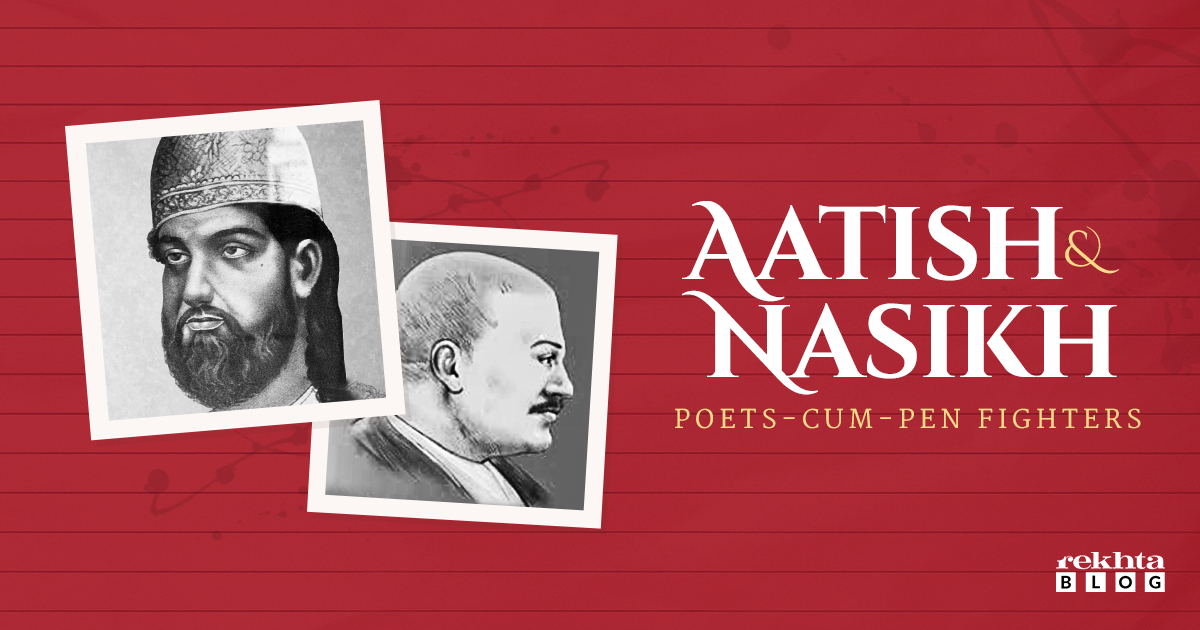
Aatish and Nasikh: Poets-cum-Pen Fighters
Inside an old house in Saraa-e-Baale Khan, sat a thin, tall man of an unassumed, unconventional temperament on his cheap jute mat under a broken-down roof, sheltered by hay and thatch. Dressed in a simple lungi, he sat in patience and contentment, spending his life like some aloof and carefree dervish. As his tilted cap rakishly fell over one of his eyebrows, he kept staring at an outdated wall ruminating about love, life, and poetry.
This was Haidar Ali, known among his countless admirers and poetry-lovers by his pen name ‘Aatish’, or Khwaja Haidar Ali Aatish. His family was a descendant of Sufis with a position of a hereditary Sufi Pir, but Aatish took up poetry, bidding adieu to his family ways and manners. But inheritances made by blood can seldom be parted from, Aatish naturally had a Faqir-like air about him, free from ostentation, he never took to materialistic, worldly pleasures and spent his days sharpening the dagger of his words, his pen, his poetry.
Aatish never stepped into the nobles’ courts to recite Ghazals, nor did he composed odes for anyone, but still received Eighty rupees from the Nawab of Lucknow. He gave around fifteen Rupees to his wife and used the rest in helping out the poor and needy. He closely attended the humble ones and hardly confronted the rich who brought presents and offerings to him, maintaining his Faqir-like status come what may.
Aatish’s fondness and pride concerning his Faqiri cachet can be guessed by one of his own couplets:
Aye humaa pesh-e-faqiri saltanat kya maal hai
Baadshah aaye hain paa-bos-e-gadaa ke waaste
In citing this couplet there is another point, this very mendicancy (Faqiri) became the fount of Aatish and Nasikh’s largely poetic and somewhat personal rivalry. At this point it is also important to learn a few things about Nasikh.
Born in Faizabad, to Khuda Bakhsh, a Tentmaker, Nasikh was adopted by a wealthy childless man fairly early on in his life. The man educated him and gave him all that he wanted and thanks to his adoptive father, he barely felt the pinch of worldly needs. Nasikh’s shrewdness took him to the dais of Mushairas again and again- which saw the expanse of ambition in his heart grow exponentially. His affluence and financial status drew important people to his doorstep, and in their company the poet in him grew as much as the person he was.
It was common knowledge that Nasikh was quite an eater, and with his bulky built, black skin, and unseemly clothes, he often became a person easy to take gibes at. Aatish, too, took a cheeky barb at Nasikh’s dark complexion in one of his verses:
Ruu-siyah dushman kaa yun paa-posh se kiije nigaar
Jaise Silhat ki sipar par zakhm ho shamsheer ka
Batter the enemy’s black face with shoes
Like sword-blows on a shield from Sylhet.
The barb in the above couplet is that ‘Sipar’ also means an animal’s hide. Now it makes sense, doesn’t it?
Aatish’s pupil Faqir Muhammad ‘Goya’ too echoed his master’s note and buttered up the incident.
Hai yaqeen gul ho jo dekhe gesu-e-dilbar charaagh
Aage kaale ke bhalaa raushan rahe kyun-kar charaagh
Nasikh responded:
Main go ki husn se zaahir mein misl-e-maah nahin
Hazaar shukr ki baatin mira siyaah nahin
Aatish culminated the argument with another saucy couplet:
Farogh-e-Husn pe kab ru-e-zulf chaltaa hai
Ye wo charaagh hai kaale ke aage jaltaa hai
Nasikh, the charm of Mushairas, often boasted that he never had an Ustad, he did his own corrections and read anything and everything. He also claimed that the disciple of Mushafi, Khwaja Haidar Ali Aatish, had made a name for himself by versifying the idiomatic language of Lucknow, otherwise there was no flare in his writings. Nasikh quotes, ‘there’s nothing but casual chit-chat; no understanding of the language, no decorum of construction, no delicacy of themes.’ He pointed out, once when Aatish returned to Lucknow from Faizabad after a long time, he heard Nasikh’s Ghazals and jealousy seized him. And thereafter, Aatish began composing verses against Nasikh with a mortal animus.
In an interesting episode, one of Nasikh’s adherents objected upon a word used in the following verse by Aatish:
Dukhtar-e-raz miri monis hai miri hamdam hai
Main jahaan-geer hun wo noor jahaan begam hai
He said, ‘Begam is a Turkish word, and is pronounced Begum, therefore the rhyming elements (Qafiya) of the two lines are a mismatch.’ Aatish, who was stoned with Bhang retorted, ‘Huhh! I don’t speak Turkish. If I speak Turkish, I will say Begum.’
Nasikh gave back to Aatish with the following verse:
Ek jaahil de rahaa hai mere divaan ka jawaab
Bu Musailam ne likha tha jaise quran ka jawab
Aatish, wasting little time quipped:
Kyun na de har momin us mulhid ke deevaan ka jawaab
Jis ne deevan apna thahraaya hai quran ka jawab
Setting aside these verbal jibes, it is important to note that upon the death of Shaikh Nasikh, Aatish composed a reflective chronogram, and from that very day he stopped composing, because the pleasure of poetry was in hearing and reciting. When the person to whom one enjoys reciting is no longer there, then it is no longer poetry, it is babble.
Know any more undiscovered anecdotes involving these two? Then feel free to take up the comment box, and share it with everyone.
NEWSLETTER
Enter your email address to follow this blog and receive notification of new posts.




